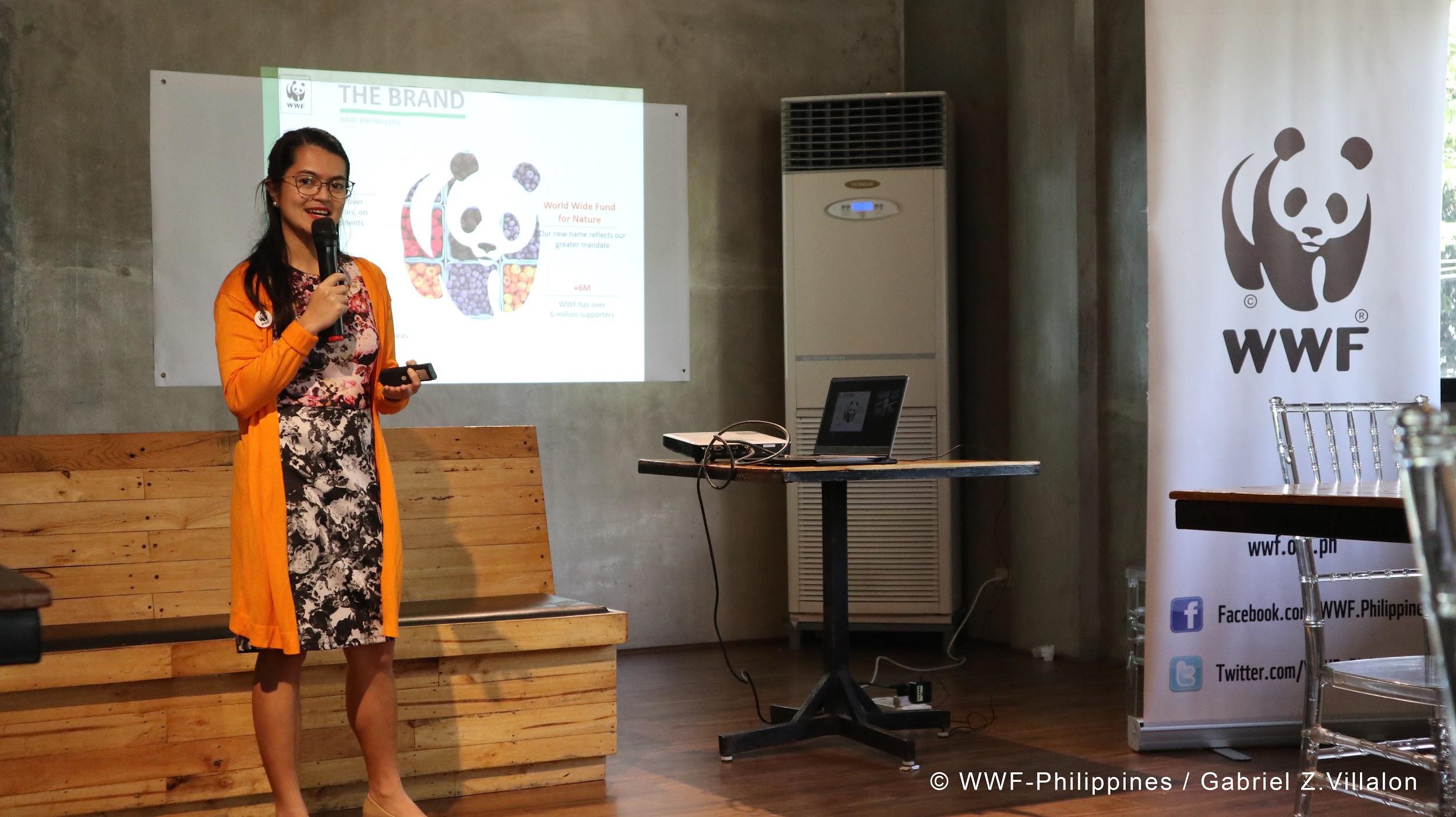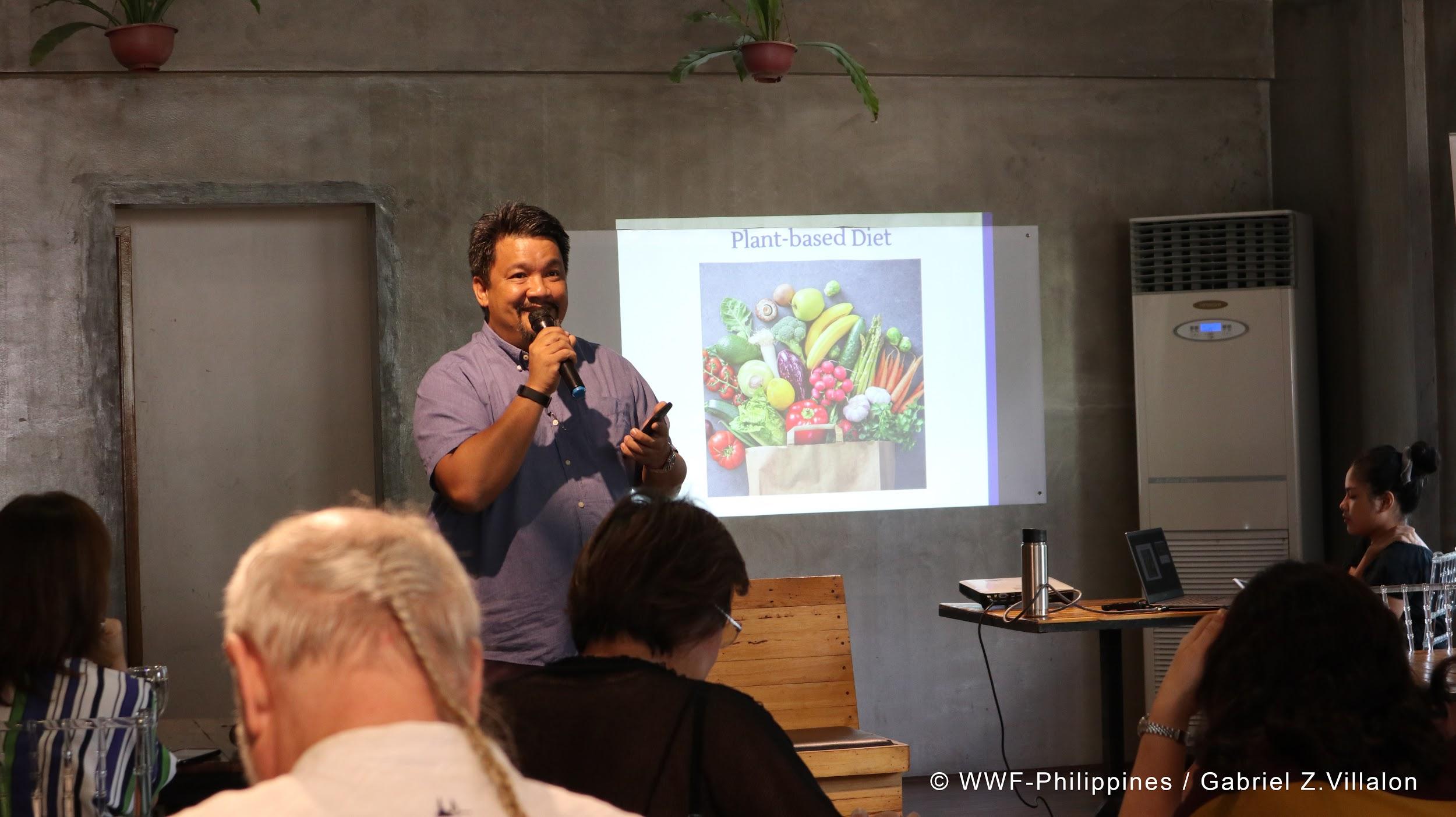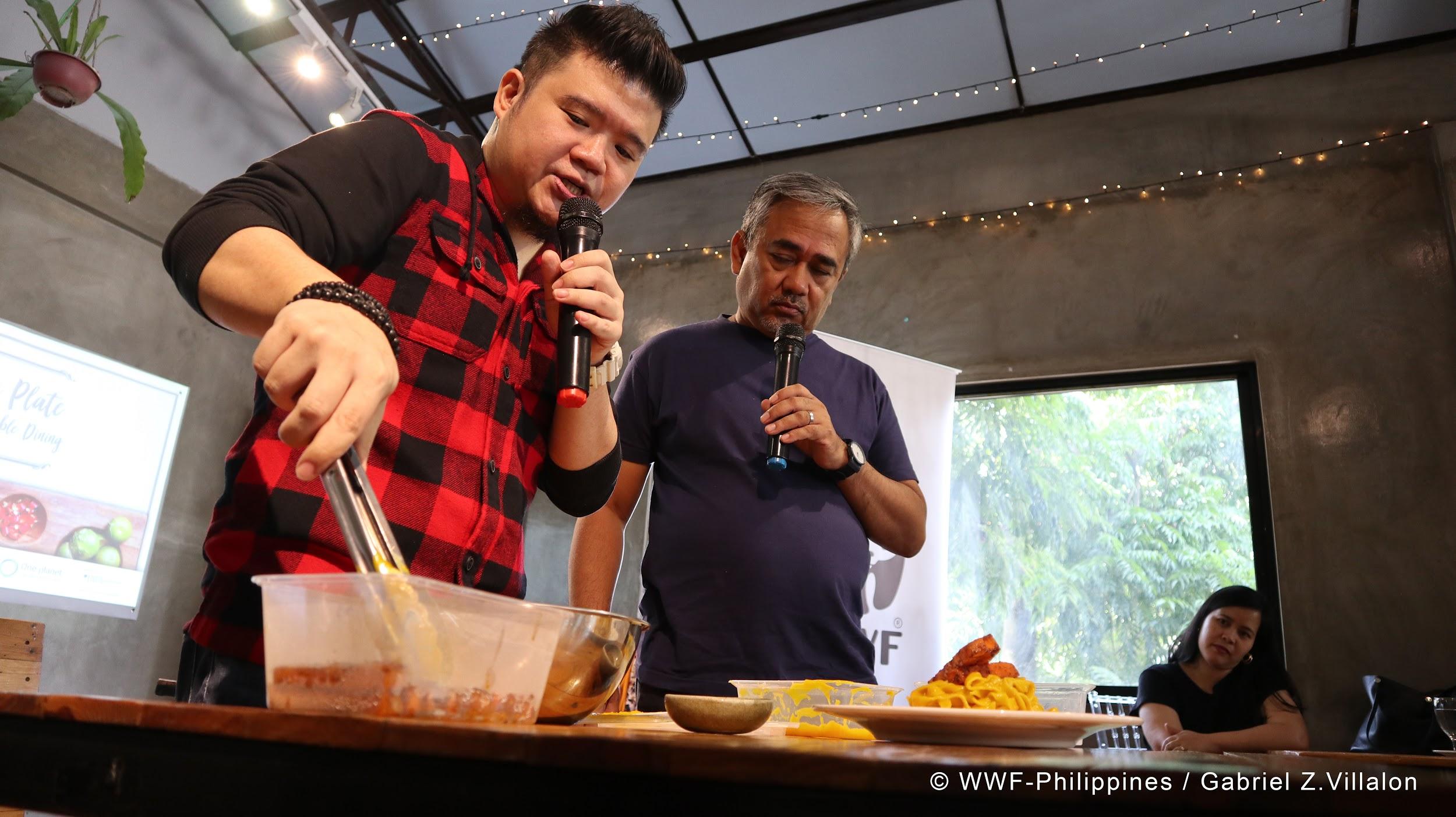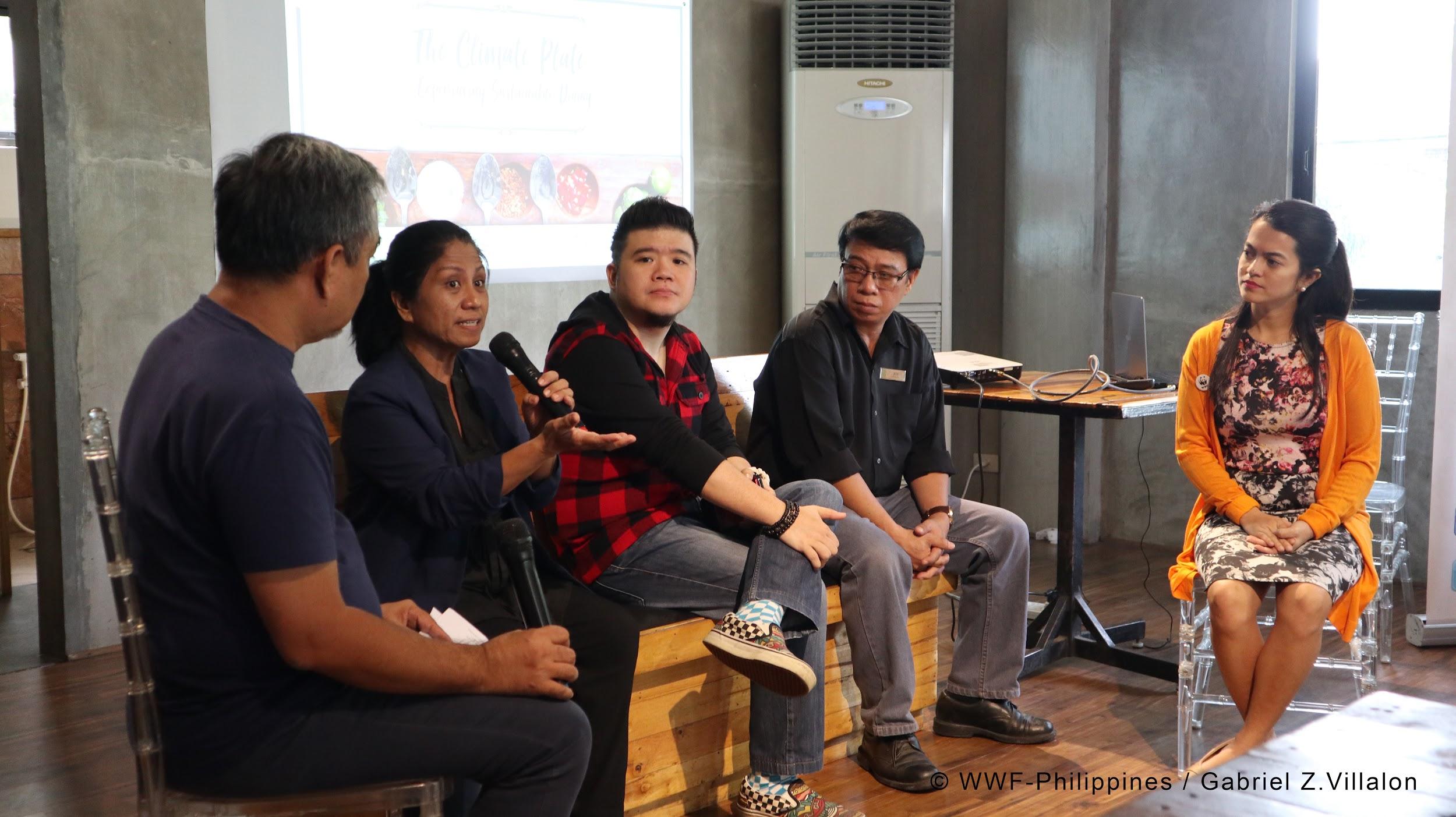The Sustainable Diner at the 12th Annual Global Warming & Climate Change Consciousness Week
November 2019

Representatives from the Climate Change Commission Philippines, WWF-Philippines, and the Quezon City Local Government Unit, through Councilors Lala Sotto and Candy Medina, gathered for a group photo with food industry professionals, chefs, restaurateurs, and members of the media.
On November 18, 2019, the World Wide Fund for Nature (WWF) Philippines, together with the Climate Change Commission (CCC) Philippines, hosted The Climate Plate: Experiencing Sustainable Dining, a forum on Sustainable Consumption and Production (SCP) in the food service sector at the Earth Kitchen in Quezon City. Led by The Sustainable Diner: A Key Ingredient for Sustainable Tourism project, the forum aims to put sustainable dining at the forefront of SCP implementation in the Philippines and to gather stakeholders from national and local government units, the food service sector, and the media to further build on the current conversation and trends surrounding food sustainability through experiential cooking demos and talks about food heritage and sustainable restaurant management. As part of Climate Change Consciousness Week 2019 celebration, the sustainable dining forum is one with the theme, “Adapting For A Sustainable Future”. According to the CCC, the week-long observance aims to highlight the importance of scaling up adaptation actions and taking proactive measures that will optimize our nation’s future - to plan, build, and support a sustainable future.
The forum opened with welcoming remarks from Hon. Emmanuel De Guzman, Secretary and Commissioner of the Climate Change Commission. In his video speech, Sec. De Guzman explained how sustainable dining supports the CCC’s continuous efforts to promote climate change adaptation and mitigation solutions for a better quality of life for Filipinos. “Transforming our food sector to a low-carbon and sustainable industry will not only reduce the carbon footprint of our industry sector, but will also help us ensure food security and lessen food wastage in the country.” says Sec. De Guzman.
Building on Sec. De Guzman’s message was Gemma Cunanan, Head of the Climate Change Commission’s Foreign-Assisted Program Management Systems (FAPMS) Division, who expressed that all of CCC’s works are anchored on sustainability because of the climate crisis we are experiencing today. “We in the CCC understand that sustainability means building adaptive capacities for Filipino communities. It means learning how we can adapt so we and other species can survive the climate crisis. The CCC looks at the experiences of different sectors on the ground and from these, we come up with national policies to be recommended to various industries through other government agencies,” says Cunanan. The role of the CCC is to consolidate relevant solutions and to bring together all sectors in order to facilitate conversations on how each can contribute to the nation’s sustainability efforts. “Sustainability has become a necessity for us because the Philippines is one of the most climate-vulnerable countries in the world. We wish to bring together everyone so we can have a common agenda that we can anchor on our individual goals and mandates.”

Alexa Jeanne Lasch, The Sustainable Diner project’s Sustainable Business Specialist, explaining WWF’s greater mandate, which includes not only wildlife conservation but also improving and ensuring sustainability in global food production and consumption practices.
Alexa Jeanne Lasch, The Sustainable Diner project’s Sustainable Business Specialist, began the program with an introduction on what WWF is and why food has become one of the organization’s major pillars in doing its conservation work. “The idea that a project like The Sustainable Diner should be implemented was actually borne from the fact that the food industry has become one of the biggest contributors to global greenhouse gas emissions. From both the production and the consumption side, the food industry is contributing to the climate crisis mostly through the environmental degradation caused by land conversion, irresponsible agricultural practices, and wastage coming from post-harvest and post-consumption operations. “We are thankful that sustainability has become a trend because it has made it easier for us to show why it is necessary in the food service industry,” says Lasch. “At first, it was difficult for us to partner with restaurants because there was no baseline data available yet, so we had to conduct different studies in order to convince businesses that going sustainable is not only good for the planet but for their profits and operations as well. We want to be able to show that proper usage of our resources would result to cost-efficient operations for restaurants and hotels.”
The project introduction was followed by a series of talks from well-known personalities in the local food industry. Guillermo “Ige” Ramos, food historian and writer, related sustainability with food heritage. “Traditional food is founded on the ideas of sustainability, culture, and heritage. One can’t live without the other because there is a symbiotic relationship between these ideas. Food heritage is sustainability in itself so if we are not sustainable, traditional food will perish,” says Ramos. “Food heritage is important because it is a part of our identity as Filipinos. If food heritage vanishes, our identity will also vanish with it.”

Chef Robby Goco shares how chefs should embrace the challenge of making vegetables taste delicious in order for diners to consider eating a more plant-based diet whenever they’re dining out in restaurants and hotels.
Three chefs then presented their experiences when it comes to implementing sustainability in their own restaurants and how the idea of sustainability has affected their outlook. Chef Waya Wijangco of Gourmet Gypsy Art Cafe shared the beginnings of her restaurant and how she had to rely on her Ilocano roots and values to build it from scratch. “I was taught by my Ilocano family to not waste anything, so for me, sustainability really means being able to utilize materials for different purposes. From the start, our restaurant had to operate sustainably because we built it primarily for our mission of helping special needs students train as cooks, servers, bakers, and administrative officers,” says Wijangco. “Contrary to popular belief, being sustainable actually helps us increase our bottom line. It means that we are not wasting water, we are not wasting energy, and we are not wasting food.” Chef Wijangco also presented a video cooking demo on one of her restaurant best-sellers, the Adlai Paella. The recipe uses organic adlai from Hineleban Farms in Bukidnon.
Chef Raoul Roberto “Robby” Goco of Cyma, Souv!, and Green Pastures shared how important local sourcing was in ensuring that his restaurant operations remain sustainable. “It is very important that the ingredients you will need for your dishes are readily available in the local market. You won’t have to import anything, plus it also allows you to talk directly to local growers so they can provide you with the fresh produce that you need. At one time, our food cost amounted to 29% of our total cost, which is below restaurant average, because we practice local sourcing,” says Goco. “As a chef and restaurateur, lessening food wastage is also very important. The first thing I look at is the garbage can - if my chefs are throwing ingredients away then they are throwing money away. My restaurants are guilty of having big menus because we try to cross-utilize every ingredient. If we have fish, we make sure the bones go to the stock and you have dishes which can use the head, the belly, the skin, and the fillet. We don’t want to throw anything away.”

Chef Sharwin Tee plating his Barbecued Carrots in Carrot Noodles dish, assisted by Mr. Ige Ramos.
Chef Sharwin Tee of Curiousity Got The Chef assembled a dish that highlights a singular vegetable: Barbecued Carrots served on top of Carrot Noodles with Carrot puree. While doing the demo, Chef Tee explained his point of view when it comes to food sustainability. “When chefs use meat in their dishes, there’s this concept called Nose To Tail Dining which we usually follow. In essence, it means respecting the animals that we are about to prepare and consume by not letting any part of them go to waste. I keep on wondering why we are not applying the same concept to vegetables,” says Tee. “Oftentimes, vegetables get wasted because not a lot of people seek out vegetable dishes when they go to restaurants. I think the best way to convert people is to make vegetables taste so good that you won’t even look for meat replacements and appreciate the vegetables for what they really are. After all, plant-based dishes are actually the ones that are more sustainable.”
Lastly, Jess Pascual of Earth Kitchen thanked the organizers for choosing their restaurant as the venue of the event. Taking the opportunity, he shared with the participants the different ways Earth Kitchen applies sustainability principles in their operations. “Healthy. Local. Sustainable. These are the three guiding principles that are at the core of every decision making process that goes into running our establishment. Ever since the restaurant opened, we have tried to always choose what’s environmentally sound,” says Pascual. “We try to use cornstarch wares and paper bags for takeouts, avoid single-use plastics when possible, use metal straws for our dine-in drinks as soon as it became available, omitting plastic bottled drinks in our menus, and source locally for the dishes that we serve our patrons. We strive to source as close to home and as ethically as possible.” Earlier, a video cooking demo of their very own Mushroom Spring Rolls was shown to the crowd.
The program ended with a panel discussion where participants were given the chance to ask questions on food sustainability, and a networking lunch showcasing Earth Kitchen’s different sustainable dishes, including the Mushroom Spring Rolls shown in their video cooking demo, as well as Gourmet Gypsy Art Cafe’s Adlai Paella.

Gemma Cunanan, Head of the CCC’s FAPMS Division, shares her thoughts on the correlation between the climate crisis and our eating habits during the panel discussion.
The Sustainable Diner project would like to express its gratitude to the Climate Change Commission for giving us the opportunity to share our advocacy on sustainable dining by including The Climate Plate as one of its official events for the 12th Annual Global Warming & Climate Change Consciousness Week. The project would also like to thank our restaurant project partners - Earth Kitchen, Gourmet Gypsy Art Cafe, and Cyma/Green Pastures - for participating and sharing their best practices during the forum.
The Sustainable Diner project, under WWF-Philippines’ Sustainable Consumption and Production, is part of the International Climate Initiative (IKI). The Federal Ministry for the Environment, Nature Conservation, and Nuclear Safety (BMU) supports this initiative on the basis of a decision adopted by the German Bundestag.
For more information, please contact:
Melody Melo-Rijk
Project Manager
mmelorijk@wwf.org.ph
For media arrangements, please contact:
Pamela Luber
Integrated Marketing Communications Specialist
pluber@wwf.org.ph
Lorayne Roque
Sustainable Consumer Specialist
lroque@wwf.org.ph
